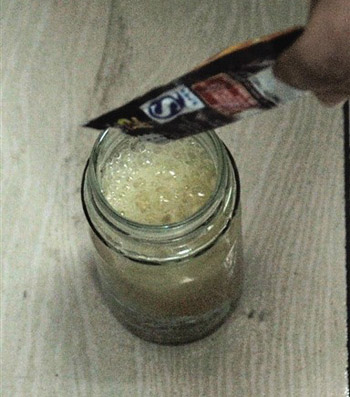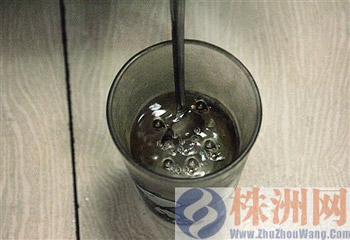Boiling coffee scalded with freshly boiled coffee in the microwave
Zhuzhou News (Zhuzhou Evening News reporter Dai Ping) A netizen became addicted to coffee and did not bother to boil water. He directly put cold water into the microwave oven to heat it. After heating for a few minutes, I took out and poured into the coffee, and something unexpected happened: the plain boiled water of the coffee was bubbling and boiling violently, and the spilled boiling water scalded the netizen.
A colleague of the reporter also made coffee in the same way. She said that sometimes she was alone at home and didn't bother to boil water in a kettle. If she wanted to make a cup of coffee, she just put it in the microwave oven. "but I've never encountered a splash of boiling water." She said.

What will happen if you boil water in the microwave? The reporter conducted an experiment.

The water boiled in the microwave is mixed with the coffee and the water bubbles out.
Photo taken by reporter Zhang Yuan
The heated water taken out of the microwave oven stirred with a spoon and began to bubble.
Photo taken by reporter Zhang Yuan
Experimental equipment: glass, water, microwave oven, spoon, coffee
Location of the experiment: office on the sixth floor of the Evening News
Experiment 1:
The reporter picked up a glass of cold water in the water cooler and heated it in the microwave oven for three and a half minutes.
In the process of heating, the reporter observed through the translucent front door of the microwave oven and found that the water in the cup was relatively calm.
When the heating time was up, the reporter took the glass out of the microwave oven with gloves and poured the prepared coffee into the cup. The coffee had just been put into the boiling water and there was little reaction.
About 2 seconds later, the boiled water mixed with coffee bubbled out like a shaken Coke. Because the reporter was prepared in advance, it was relatively far away, and there was not much pure water, so it was not scalded.
Experiment 2:
The reporter also picked up a glass of cold water in the drinking fountain and heated it in the microwave oven for three and a half minutes.
When the heating time was up, the reporter took the glass out of the microwave oven and put it on the ground, then took a spoon and stirred it several times. At this time, the boiled water in the cup suddenly bubbled and boiled.
Experiment 3:
The reporter also picked up a glass of cold water in the drinking fountain and heated it in the microwave oven for three and a half minutes.
When the heating time was up, the reporter was not in a hurry to take out the glass, but left it in the microwave oven for a minute, then took it out and put it on the ground. Wait for the reporter to pour the coffee into the boiling water, the water surface is calm, there is no boiling phenomenon.
That's boiling water.
The results of the three groups of experiments are different. The reporter consulted Huang Leyang, a senior physics teacher at the Zhuzhou affiliated School of Beijing normal University.
Teacher Huang said that the reporter's experiment 1 and experiment 2 actually had a "sudden boiling" phenomenon. Microwave heating is used to drive water molecules to vibrate, which is a forced vibration, and the violent vibration of the molecules (2.45 billion vibrations per second) leads to a sudden rise in the temperature of the body.
The microwave oven heats water from all directions, which is different from convective heat transfer-we usually boil water in a kettle, the water below is heated first, and the temperature of the water above is relatively low, and there is a process of convection between the two. Therefore, using microwave to heat hot water, even if it reaches the boiling point, the tumbling phenomenon of convection is not seen, and it is still in a calm state. When we add something to the water, this balance is broken (the vibration of 2.45 billion times per second does not stop suddenly, and the vibration law is broken after encountering spoons, coffee, etc.), the water is likely to "boil" and the heat explodes in an instant. The liquid jumps up.
When brewing coffee, the acid and a little lime in the coffee will decompose carbon dioxide and heat when it comes to boiling water at 100 degrees Celsius. In this way, the effect of sudden boiling of water is more obvious.
And put the boiling water in the microwave oven for a period of time, the water temperature drops, the movement of molecules inside the liquid slows down, and then put something inside, the "sudden boiling" situation will not occur.
China Coffee Trading Network: www.gafei.com
Important Notice :
前街咖啡 FrontStreet Coffee has moved to new addredd:
FrontStreet Coffee Address: 315,Donghua East Road,GuangZhou
Tel:020 38364473
- Prev

Board games have sprung up in Fuzhou coffee shop
On the morning of the 10th, the reporter saw a coffee shop with the theme of board games on Daming Road. From the external decoration, it looked like an art studio. Take a closer look, the corner of the billboard says "board game themed coffee shop".
- Next

Yunnan Coffee beans pirated Pu'er Tea Crazy
From selling and hoarding, to selling at a low price, and then to Nestl é suspending acquisitions, the coffee growing craze has gradually sobered up because of this sudden harvest stoppage. Apart from being sober, a reflection on the coffee industry in Yunnan has more practical significance.
Related
- Can lightly roasted coffee beans be used to extract espresso? How finely should you grind high-quality coffee beans to make Italian latte?
- What is the difference between the world's top rose summer coffee and Yejia Shefi? What are the flavor characteristics of Yega Shefi coffee and Panama rose summer?
- The ceremony is full! Starbucks starts to cut the ribbon at a complimentary coffee station?!
- A whole Michelin meal?! Lucky launches the new "Small Butter Apple Crispy Latte"
- Three tips for adjusting espresso on rainy days! Quickly find the right water temperature, powder, and grinding ratio for espresso!
- How much hot water does it take to brew hanging ear coffee? How does it taste best? Can hot water from the water dispenser be used to make ear drip coffee?
- What grade does Jamaica Blue Mountain No. 1 coffee belong to and how to drink it better? What is the highest grade of Blue Mountain coffee for coffee aristocrats?
- What are the flavor characteristics of the world-famous coffee Blue Mountain No. 1 Golden Mantelin? What are the characteristics of deep-roasted bitter coffee?
- Can I make coffee a second time in an Italian hand-brewed mocha pot? Why can't coffee be brewed several times like tea leaves?
- Hand-brewed coffee flows with a knife and a tornado. How to brew it? What is the proportion of grinding water and water temperature divided into?

